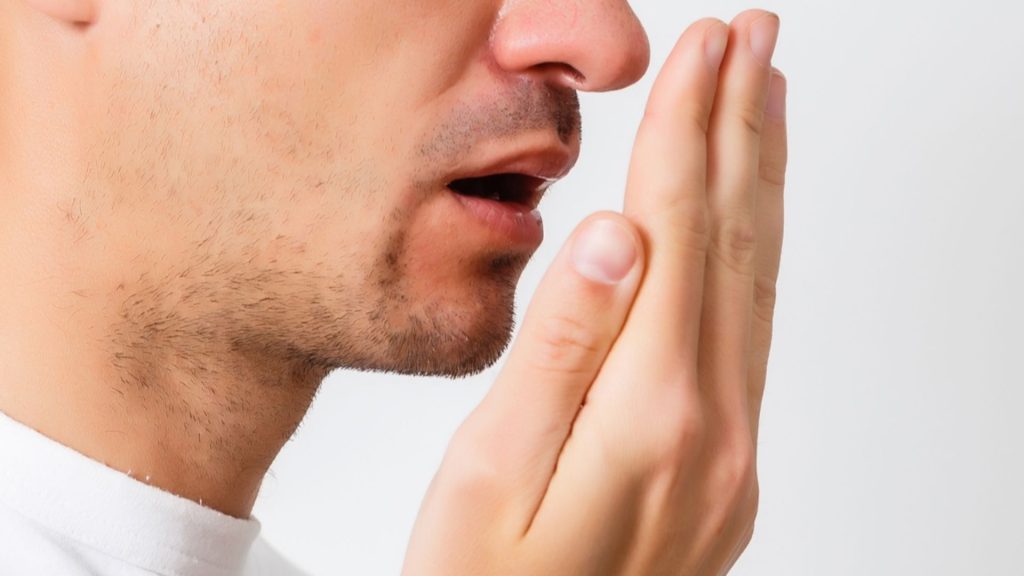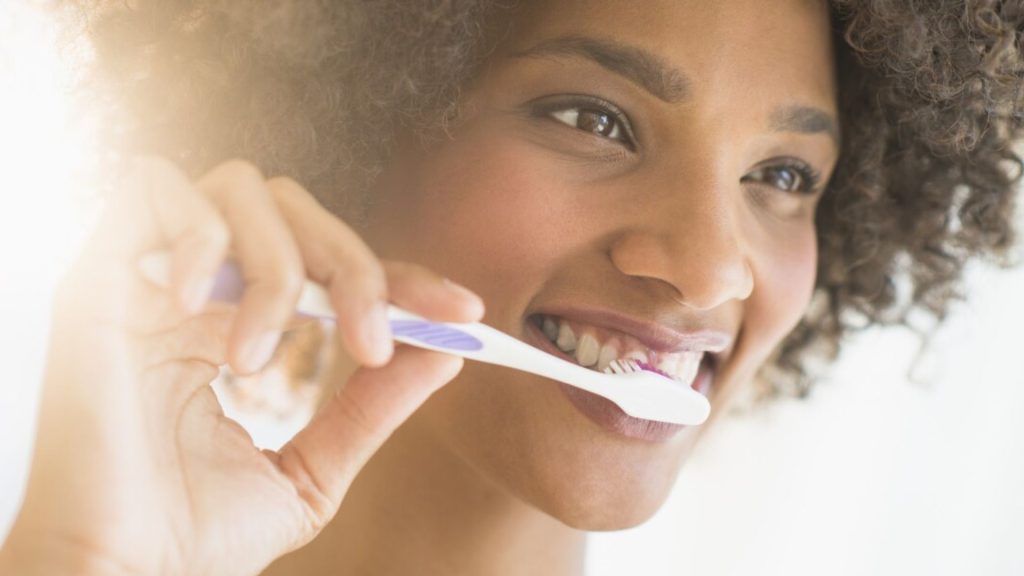Why does my breath smell bad even after brushing? Even after brushing, bad breath might indicate a variety of health issues. Common reasons for bad breath include food residues, germs in the mouth, gum disease, and dry mouth. Proper dental hygiene and a healthy lifestyle may typically fix these reasons.
This post will explore why your breath may smell bad after brushing. Oral hygiene and underlying health issues may cause poor breath. Understanding the reasons is crucial to solving this issue, returning fresh breath and self-confidence.
Why Does My Breath Smell Bad Even After Brushing?

Even after brushing your teeth, you might still have bad breath for a number of reasons. Some typical explanations include:
- Food remnants: Food particles can stick to your teeth, mouth, and in between your teeth, which makes it easy for bacteria that cause bad breath to grow. If you don’t floss or brush correctly, brushing and washing won’t eliminate this residue.
- Gum disease: Germs in the mouth that cause gingivitis can lead to bad breath. Strong breakers may induce odors when plaque and germs build up around the gums.
- Bacteria in the mouth: After brushing, some germs remain in the mouth. These bacteria break down food and generate odor-causing chemicals after eating.
- Xerostomia (dry mouth): Less saliva in the mouth allows germs to proliferate and create foul breath. There are a number of potential reasons for dry mouth, including medicine, stress, dehydration, and medical conditions.
- Digestive problems: Certain digestive problems such as peptic ulcers, liver dysfunction or gastroesophageal reflux can also cause bad breath.
Disease Causes Bad Breath Even After Brushing?
Having bad breath despite regular brushing might be an indication of illness. There are many common things that can cause bad breath from the mouth, such as leftover food, germs in the mouth, gum disease, dry mouth, or not taking good care of your teeth.
However, mouth odor might indicate more significant health issues, such as:
- Oral conditions: Bad breath may result from gingivitis, oral ulcers, pharyngitis, or Streptococcus mutans bacterium.
- Digestive problems: Bad breath may result from stomach ulcers, liver problems, gastroesophageal reflux illness, or intestinal worms.
- Respiratory conditions: Bad breath can come from the mouth if you have a nasal system illness, bacteria in your lungs, or bacteria that can spread to other people.
- General medical conditions: Liver, renal, endocrine, and diabetes may produce foul breath.
The Remedy To Bad Breath After Brushing Teeth

A bad smell after brushing your teeth can make you uncomfortable and hurt your self-esteem. Don’t worry—there are numerous effective ways to fix this. Working hard and taking the correct steps may restore confidence and fresh breath. Bad breath after brushing? Try these treatments.
- Brush properly: At least twice a day, rinse your teeth for 2 minutes. Use a soft-bristled toothbrush to clean around the teeth and gums. The tongue’s surface may also harbor odor-causing germs, so brush it too.
- Use floss and rinse: Remove food and germs between teeth using dental floss. After brushing, clean your mouth with a mouthwash that has sunscreen or an antibiotic agent. Cleans the mouth and inhibits odor-causing germs.
- Gum Care: Preventing gingivitis and plaque requires gum care and cleansing. Gently massage and clean the gum region with the gum brush.
- Drink enough water: Water prevents bad breath by maintaining saliva levels. Saliva cleanses the mouth.
- Avoid odorous meals: Foods like garlic, onions, coffee, booze, and smoke can cause bad breath. Limit intake or wipe your mouth after eating these items to minimize odors.
- Overall health check: If foul breath persists following the aforementioned steps, see a dentist to rule out digestive or oral diseases.
Conclusion

In daily life, having fresh breath is an important way to make people feel comfortable and close to you. But sometimes, even if you work hard to brush your teeth, your breath can still make you feel bad and smell bad. This can make you feel nervous and embarrassed in everyday conversations.
Having regular dental checkups at the Spring Orchid Dental Clinic is a good way to solve this situation. Here, you’ll be greeted by a team of skilled dentists and treated with the latest technology. After brushing, you’ll get expert dental treatment and ways to avoid bad breath.
Also, the Spring Orchid Centre gives skilled teeth cleaning to get rid of plaque, dirt, and germs that cause bad breath. With fresh breath and a clean mouth after a thorough dental cleaning, you’ll feel like a new person.
FAQs
Why Does Toothpaste Worsen Breath?
If you think toothpaste is making your breath smell worse, there are a few things that could be going on:
- Toothpaste antibacterials: Some toothpaste has antibacterial ingredients like triclosan or chlorhexidine. They have powerful antibacterial properties, but when they interact with oral germs, they may smell.
- Foaming agents and flavorings: To freshen, certain toothpaste include foaming agents and flavorings. However, some people may react to these ingredients and have worse breath after using the toothpaste.
- Not cleaning enough: If you don’t brush or clean between your teeth, food and germs may stay in your mouth and produce foul breath. The toothpaste you use may simply conceal the odor.
- Other oral health problems: Mouth infections, gum disease, and other dental issues may also produce foul breath.
Can Stress Cause Bad Breath?
Yes, worry can make your breath stink. When you’re stressed, your body makes more cortisol, which is a stress hormone. Cortisol can affect many parts of your body, including your teeth. Stress causes foul breath:
- Dry mouth: Stress reduces saliva production, causing dry mouth. Saliva removes food and microorganisms from your mouth. Dry mouths breed germs, causing foul breath.
- Changes in oral hygiene routine: Some people disregard their dental hygiene practice during stressful times. Poor brushing, flossing, and tongue cleansing may cause foul breath.
- Increased likelihood of unhealthy habits: When worried, individuals may smoke, drink too much, or skip meals. These practices cause foul breath.
- Gastric acid reflux: Stress may make gastric acid reflux symptoms worse. The tongue may taste this acid, giving foul breath.
How Do You Know If Your Breath Stinks?
Yes, worry can make your breath stink. When you’re stressed, your body makes more cortisol, which is a stress hormone. Cortisol can affect many parts of your body, including your teeth. Stress causes foul breath:
- Dry mouth: Stress reduces saliva production, causing dry mouth. Saliva removes food and microorganisms from your mouth. Dry mouths breed germs, causing foul breath.
- Changes in oral hygiene routine: Some people disregard their dental hygiene practice during stressful times. Poor brushing, flossing, and tongue cleansing may cause foul breath.
- Increased likelihood of unhealthy habits: When worried, individuals may smoke, drink too much, or skip meals. These practices cause foul breath.
- Gastric acid reflux: Stress may make gastric acid reflux symptoms worse. The tongue may taste this acid, giving foul breath.





